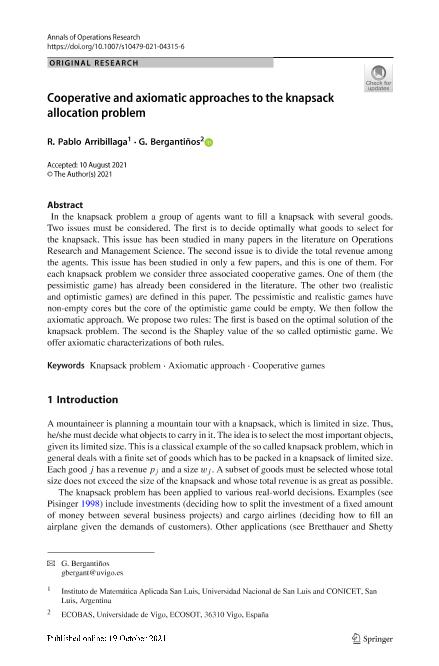Mostrar el registro sencillo del ítem
dc.contributor.author
Arribillaga, Roberto Pablo

dc.contributor.author
Bergantiños, Gustavo
dc.date.available
2022-12-29T02:46:07Z
dc.date.issued
2021-10
dc.identifier.citation
Arribillaga, Roberto Pablo; Bergantiños, Gustavo; Cooperative and axiomatic approaches to the knapsack allocation problem; Springer; Annals Of Operations Research; 318; 2; 10-2021; 805-830
dc.identifier.issn
0254-5330
dc.identifier.uri
http://hdl.handle.net/11336/182769
dc.description.abstract
In the knapsack problem a group of agents want to fill a knapsack with several goods. Two issues must be considered. The first is to decide optimally what goods to select for the knapsack. This issue has been studied in many papers in the literature on Operations Research and Management Science. The second issue is to divide the total revenue among the agents. This issue has been studied in only a few papers, and this is one of them. For each knapsack problem we consider three associated cooperative games. One of them (the pessimistic game) has already been considered in the literature. The other two (realistic and optimistic games) are defined in this paper. The pessimistic and realistic games have non-empty cores but the core of the optimistic game could be empty. We then follow the axiomatic approach. We propose two rules: The first is based on the optimal solution of the knapsack problem. The second is the Shapley value of the so called optimistic game. We offer axiomatic characterizations of both rules.
dc.format
application/pdf
dc.language.iso
eng
dc.publisher
Springer

dc.rights
info:eu-repo/semantics/openAccess
dc.rights.uri
https://creativecommons.org/licenses/by-nc-sa/2.5/ar/
dc.subject
AXIOMATIC APPROACH
dc.subject
COOPERATIVE GAMES
dc.subject
KNAPSACK PROBLEM
dc.subject.classification
Matemática Aplicada

dc.subject.classification
Matemáticas

dc.subject.classification
CIENCIAS NATURALES Y EXACTAS

dc.title
Cooperative and axiomatic approaches to the knapsack allocation problem
dc.type
info:eu-repo/semantics/article
dc.type
info:ar-repo/semantics/artículo
dc.type
info:eu-repo/semantics/publishedVersion
dc.date.updated
2022-10-04T14:39:41Z
dc.journal.volume
318
dc.journal.number
2
dc.journal.pagination
805-830
dc.journal.pais
Alemania

dc.description.fil
Fil: Arribillaga, Roberto Pablo. Universidad Nacional de San Luis. Facultad de Ciencias Físico, Matemáticas y Naturales. Departamento de Matemáticas; Argentina. Consejo Nacional de Investigaciones Científicas y Técnicas. Centro Científico Tecnológico Conicet - San Luis. Instituto de Matemática Aplicada de San Luis "Prof. Ezio Marchi". Universidad Nacional de San Luis. Facultad de Ciencias Físico, Matemáticas y Naturales. Instituto de Matemática Aplicada de San Luis "Prof. Ezio Marchi"; Argentina
dc.description.fil
Fil: Bergantiños, Gustavo. Universidad de Vigo; España
dc.journal.title
Annals Of Operations Research

dc.relation.alternativeid
info:eu-repo/semantics/altIdentifier/url/https://link.springer.com/10.1007/s10479-021-04315-6
dc.relation.alternativeid
info:eu-repo/semantics/altIdentifier/doi/http://dx.doi.org/10.1007/s10479-021-04315-6
Archivos asociados
